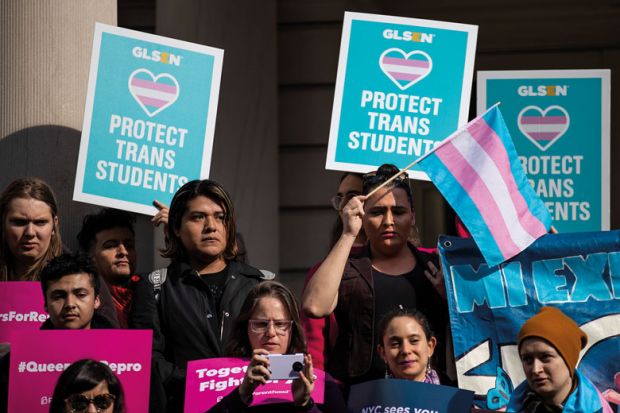The Biden administration is nearing the point of issuing new rules addressing sex-based discrimination in US education just as the question grows ever more complicated for students and faculty.
The new regulations have been percolating since Joe Biden took office, with higher education leaders pleading for a reversal of Trump-era rules that weakened victim rights in sexual harassment and abuse cases.
The administration meanwhile is moulding the upcoming rule changes to reflect ever-greater attention to transgender discrimination, saying that too is a matter worthy of greater federal civil rights protections.
Just as the administration reaches the planned release of the regulatory language on that matter, new cases across US higher education are illustrating the complexity of concerns and degree of political headwinds it faces.
One of the more complicated examples has just played out at Shawnee State University in Ohio, where the institution agreed to pay $400,000 (£311,000) to a professor over its handling of the way that he addressed a transgender student in class.
The professor of philosophy, Nicholas Meriwether, had a habit of addressing his students with honorifics, and he was alleged in 2018 to have repeatedly used “sir” in addressing a transgender female student, despite her requests that he not do so.
An investigation by university concluded that the professor had created a “hostile environment” and threatened him with suspension or firing. A federal court last year ruled in his favour, and he reached the financial settlement this month.
The case shows both that transgender students need better protections, and that getting there can be complicated, said Inara Scott, a professor of law at Oregon State University who specialises in academic freedom in higher education.
The specific facts in the Meriwether case suggest a faculty member who may have wanted to show his student the understanding she deserved, and sometimes might have simply forgotten, but also doesn’t appear to have done enough to truly protect her from harm, Professor Scott said.
“It is incredibly important for all of us to think about how we create space for people who are very well intentioned and make mistakes,” Professor Scott said. “On the other hand, it’s really important to us to recognise the harm that is done to transgender or gender-nonconforming students if they’re not appropriately identified.”
Another recent example of a complicated challenge involves Barnard College at Columbia University, the private women’s liberal arts institution, which has generated some concern on campus by requiring that all applicants for admission sign a commitment that they identify as female.
Despite maintaining that requirement, the college acknowledges that “gender, in all of its iterations, is fluid”, and that some of its students stop identifying as women after they enrol. “While this may at first seem like a paradox, consider that college is a transformative time for many students,” Barnard explains in a policy statement.
The Biden administration, in marking International Transgender Day of Visibility last month, said it was revising the application process for federal student aid to help students change their gender identification more easily.
The challenge of writing new federal regulations concerning transgender rights comes on top of the already controversial topic of campus procedures for adjudicating sexual assault complaints. Federal law creates an expectation for campuses to handle such investigations, and rules as revised during the Trump administration gave those accused the right to hire outside professionals to question their accusers in formal hearings.
The main US higher education grouping, American Council on Education, led opposition to that change, saying it created an openly confrontational process that discourages traumatised victims from reporting assaults.




